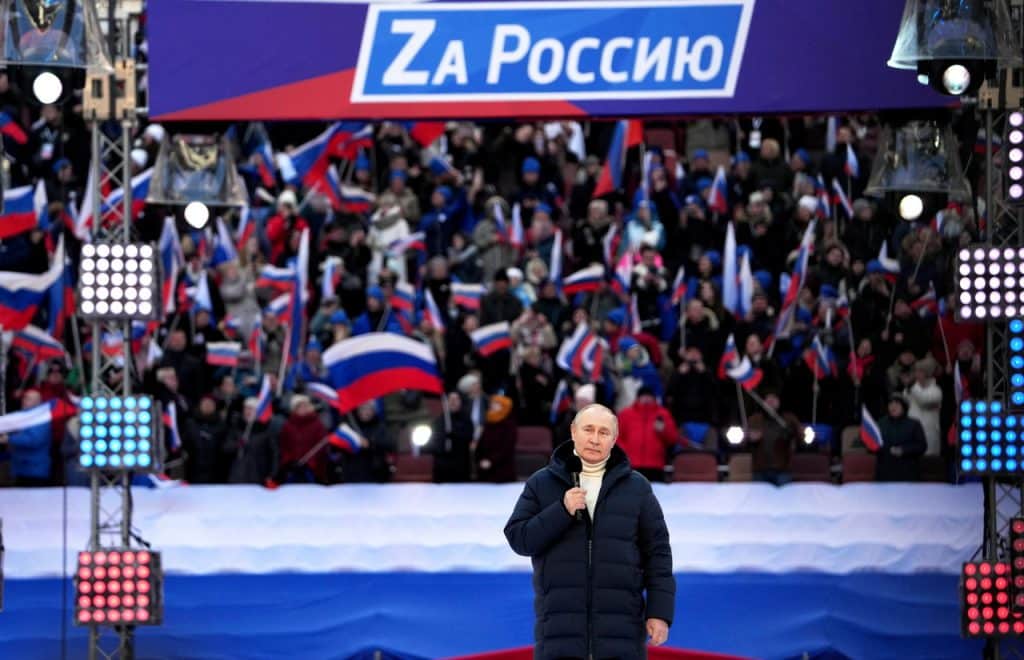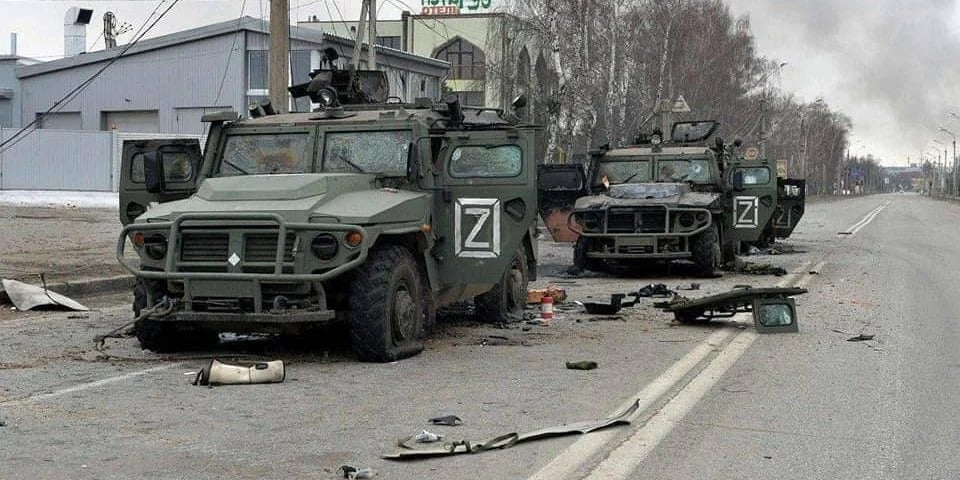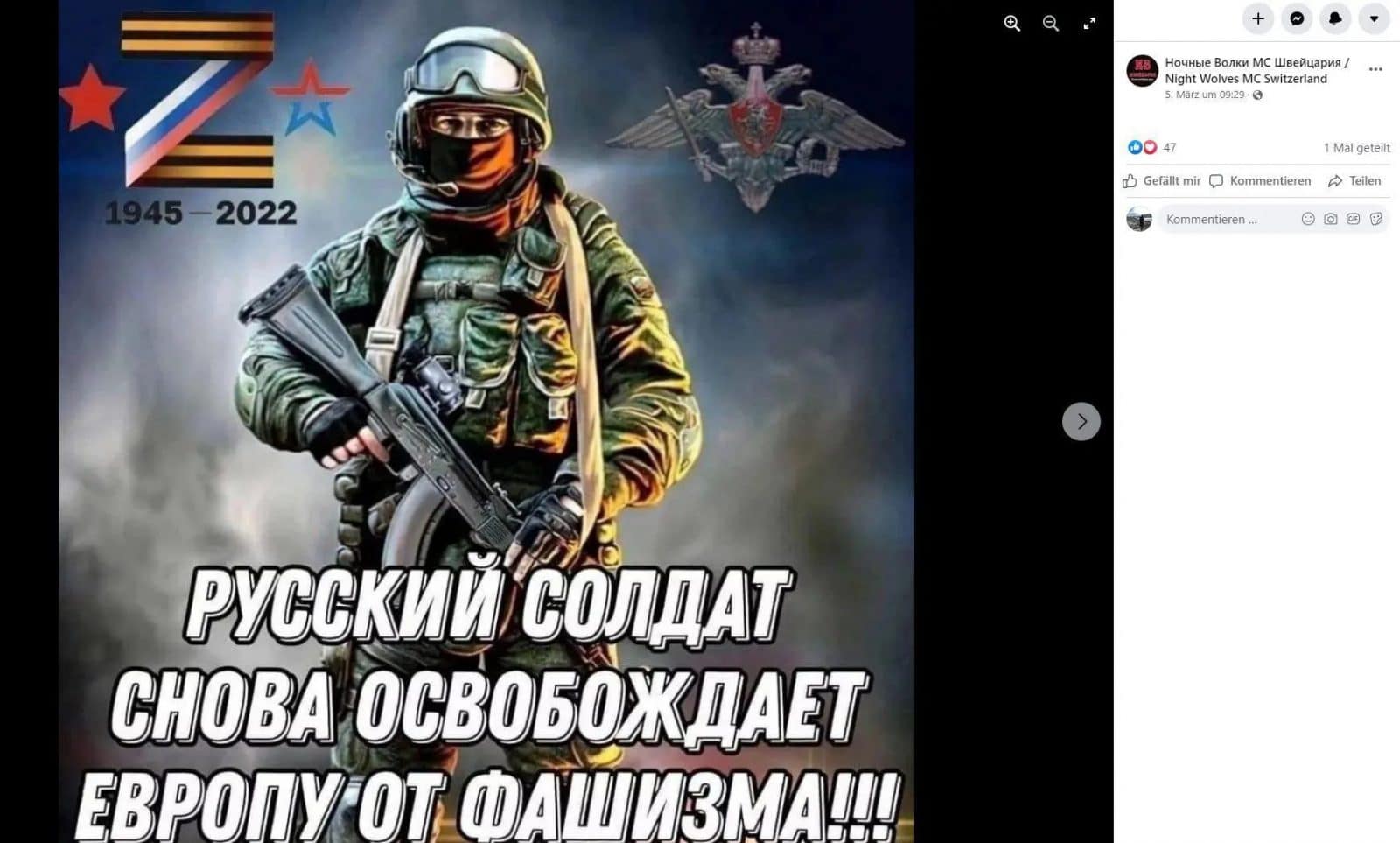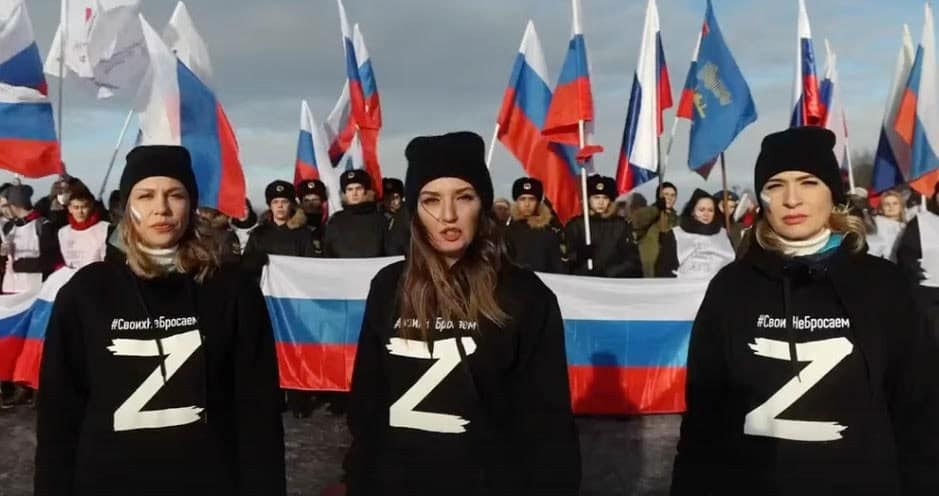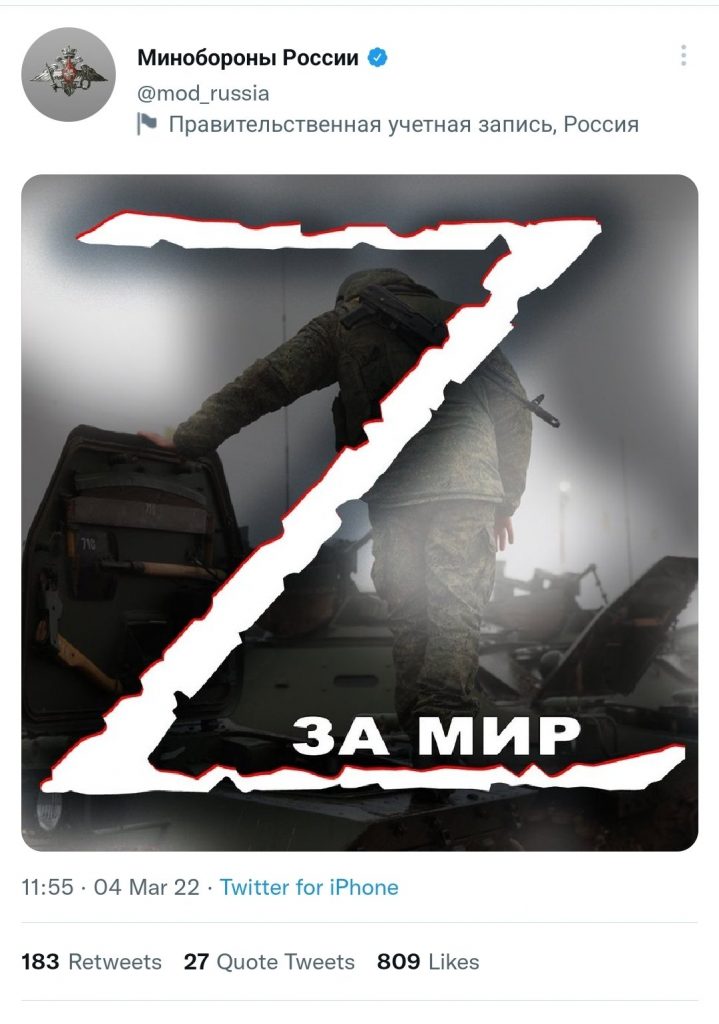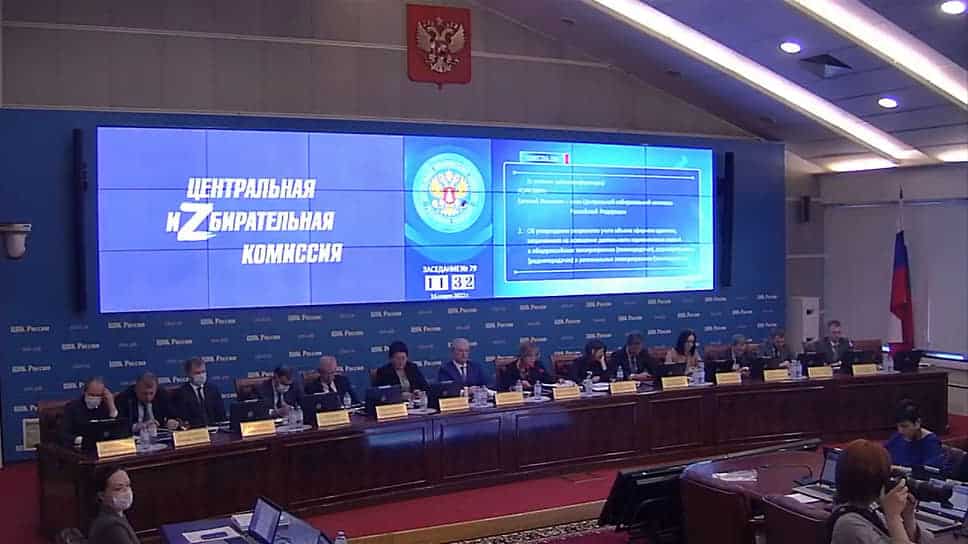Table of Contents
The Russian-Ukrainian war revealed a true face of Russia, Putinism, and Russian society. Depicted with the most prestigious epithets as “Russian civilisation”, “Russian system”, and “Russian spirit” turned out to be anti-civilisation, anti-system, and a devil’s darkness that fills human-like shells. In one of the latest videos, a Russian tank aims direct fire at the armless, old citizen of Mariupol, and turns him into biological dust, demonstrated to the world virtually the ultimate evil as it comes. Without any trace of any civilisation, humanism, or sentiments.
For the world, which is hiding behind the stereotypes and meanings of Russian classics, it became a true awakening. The consciousness of Western leaders could only cope towards the end of the second week of the so-called “special operation”. Only around week three, the common people of the world, watching the unseen crimes online, dismissed Russian “soft power” as a scam, the power Moscow spent so much effort to grow. The words “Russia” and “russians” are written with small letters in the West now – against the previously set grammar rules, defining the exclusion from the circle of civilised countries and nations.
Totalitarian metastasis
In the meantime, the people in Russia itself, who were always attributed with endless sentimentalism, humanity, and hard-working nature, are watching the very genocide of Ukrainians in the most infernal forms with cynicism and complete indifference. As well as the mass extermination of the “freedom fighters”, flesh from their own flesh. A complete loss of sympathy for the inhumane suffering and willingness to be a part of the destruction machine for the whole nation in the name of made-up, ignorant excuses clearly documents that the population of the RF is in an altered state of consciousness. The world has a unique opportunity to study with a magnifying glass exactly what is a totalitarian society and what deathly danger it represents to everyone around today.
The letter “Z” placed on the Russain army transport became a symbol of the rashism
A mass, historical reconstruction, with the slogan “We will do it again” immersed Russians in their dark, but fairly recent past. The establishment of the totalitarian elements at the institutional as well as the mental levels is happening a third time round in the past century and demonstrates a catastrophic deformity of the basic foundations for the government- and nation-forming.
“A cult of personality is not the main characteristic of Stalin regime but merely a popular Khrushchev’s quote, who used it first-hand. The worst in Stalinism is not a glorification of a dictator but terror and falsifications, which are at the very core of a dictator’s politics”, – noted historian Robert Conquest shortly before the dissolution of the Soviet Union.
From today’s clear perspective we could add that the worst thing about Stalinism is the destructive influence on the core, valuable basis of the reconstitution of the society, a mass dysplasia of the consciousness, which manifests itself in the mimicry of the population as well as transforming the number of professional stratums into predators which would work for the Bolshevik’s Terror – physically as well as ideologically, in the Chekist’s torture cells, in the Soviet press, and Soviet school. If we use the metaphor language, it is about a complete, surgical removal of a Godly image from the “homo soveticus” and his transformation into a special, social being that is being reproduced, and sadly continuing to reproduce in the context of antihumanism. This is the most damaging effect of the undefeated Stalinism.
Russian bikers club in Switzerland posted in Instagram: “Russian soldier liberates Europe from fascism again”
Unlike Ukraine, Russia didn’t move on in the direction of recognising its totalitarian traumas and engaging the masses to totalitarian practices (and therefore – the collective responsibility each and everyone for the tragedy caused by the totalitarianism) practically didn’t happen at all. At first there were half-hearted attempts to comprehend and assess Stalinism legally. Intellectual awakening in the thick of the Soviet population monolith began during “Khrushchev Thaw”. Short-lived government de-Stalinisation started during XX session of the CPSU. Back then, as noted by Anna Akhmatova, two Russias – one that was incarcerating and another – incarcerated, looked each other into the eyes. The metaphor of the great poetess didn’t reflect the entirety of the catastrophe of the repressed country, which came out from the concentration camps didn’t get a chance for the adequate rehabilitation, and compensation for the moral and financial losses. As the CPSU didn’t want to discredit a communist ideology as such, the state and the people were forced to exist in the coordinate system of the selective historical amnesia, where the victims were parayars for the rest of their life (with rare exceptions).
Several generations of the Soviet-Bolshevik terror victims were bumping into their torturers every day, and dissidents, political emigration, anti-Soviet intellectual underground mentally reproduced in the hidden, deformed algorithm, as “two Russias” after looking into each other’s eyes, they pretended nothing happened. The state raped the society, only partially reviewed some cases, “set up” some the guilty verdicts and brushed under the real scale of the catastrophe. The victims haven’t lived to see the justice. Several decades of such a status quo, where the state did not acknowledge the government crimes, and the victims were silenced prolonged the existence of the system but didn’t add to its longevity. In fact, the mass state terror of Stalin times transformed USSR into a walking zombie. The abscess burst during Perestroika times. The politics of Glasnost, that was the new tool to control the process of Soviet system renewal, its modernisation and liberalisation, became an uncontrolled instrument of destruction – in the beginning of set lies in the “Short course of the VKPB”, then later – ideological build-up of the USSR, and in the end the union itself.
Russian rally in support of the war
The uncovering of a simple fact, that almost all of the USSR history is falsified, it is a history of CPSU, not the countries or the nations that are part of it, became a detonator.
As Charles Clover noted: “Soviet society craved an alternative version of history. It started the search for the national roots that Communist party tried to diligently destroy”.
The Soviet republics rapidly developed the process of national renaissance, which didn’t leave Ukraine aside. Its scale was truly staggering and presented never seen before, or simply ignored, “brotherly nations”, whose images, history, hopes, and cultural codes were totally different from the ones in the Soviet discourse and mass consciousness. The world didn’t hesitate to recognise the authenticity of the Baltic republics and did not object to the characteristics of the former Asian satellites of the USSR.
See also: Hybrid technology of ethnic pressures: instrument of the Russian geostrategy
It was a lot more complex with Belarus and Ukraine. In general, the West’s position was a concept “Russia first”, which not only granted Russia priority among the post-Soviet states but also wouldn’t identify Ukraine for a long time as a sovereign subject. Meantime, in Russia the sovereignty of Ukraine and its more and more independent politics, which was moving away from the Russian narrative and canons of Russian historiography as well as the rest of the changes, were treated as a nasty but fleeting mishap. The idea of artificiality of sovereigns of Ukraine and Belarus, as they were “gifted”, was deeply rooted not only in the consciousness of Moscow political circles but in the widest circles of Russian intellectuals. They didn’t realise that it wasn’t the sovereignty that was artificial but their very ideas about the nature of this sovereignty and about the reasons that made Bolsheviks to agree to it in 1920. Chauvinists’ notions that were widely spread amongst the people of metropolis, were the direct result of several generations of historians and philosophers work, who shaped all Soviet socio-humanities into Procrustean bed of “Short course of history VKP(B)”. After becoming the political heir of the USSR and the Russian Empire, The Russian Federation inherited and “artistically moulded” their historiographical and historicosophical heritage.
Eternal mobilisation
With the background of insurgence of nationalistic powers amongst post-Soviet territories, Russia looked more and more like an exception from the rules: Russian nationalism was acquiring mostly chauvinistic aftertaste. Similarly, to the fall of the Russian Empire resentment became a leading trend amongst so-called elites that tried to build a future road map for Russia and Russians on the ruins of Marx-Lenin ideology, using ideas and conceptual models from the previous eras. Moreover, the immersion into a made-up, glorious past destroyed any chances for future not only for Russian people but for everyone who one way or the other was unlucky to be in the scope of Moscow’s political interest. Russia was present in all “hotspots” of the world, and unrecognised – read “occupied by Russia’ ‘ – territories. (It was only recently the UNO dared to use an adequate definition for Pridnestrovie). In fact, current problems in the countries, that were under ideological dictatorship and economical protectorate the USSR, and after its heir the Russian Federation, were a projection of “cold war” and as a consequence a deep necrosis of mental body of the USSR, which is poisoning not only Ukraine but the whole modern world, taking away its ability to move forward. The USSR is seemingly dead, but the carriers of its mental heritage are still alive and continue to poison the world.
See also: The Logic and Risks Behind Russia’s Statelet Sponsorship
The shameful offensive operation during the five-days war with Georgia in 2008 became a catalyst of renewal of the Russian army and strengthening its propaganda brainwashing. Important changes were taking place in international politics. The world leaders turned their blind eye to the militarisation that became a leading trend of Russian political development.
Ex advisor to the Kremlin master, Russian economist Andrey Illarionov wrote: “You wouldn’t be able to trace a single year without some so-called “hot meals” that wouldn’t end up with death of people, many of them”.
Putin’s reign was indeed marked with the active Russian involvement, its special contingents or “volunteers” in the selection of the local conflicts, where it was about the opposition of the systems in one or the other way. It didn’t just shape Russian diplomacy and international government doctrine in a conceptual and ideological way. It significantly grew and mutated the government vertical, responsible for the state security (read – the regime security) and keeping in line with the state and international interests of political power circles. National Security became the carcass of the system during Putin’s reign.
The double standards and moral hypocrisy became a side effect of these changes, similar to Stalin’s times: for the use of the chosen and for the “wider masses”.
Official account of the Russian Ministry of Defence published the symbol of the Russian invasion of Ukraine “Z” in the tradition of Soviet hypocrisy: “Za Mir” = “For Peace”
A constant negative mobilisation provoked significant changed inside Russian population: in this very context a whole generation grew up of “military drafted” (Chechen fighters, all sorts of political “volunteers”, as well as PMC such as “Wagner”), all set out for the terror on the industrial scale. Alongside the renewed military attempt and growing efforts of the power block, a slow Stalinisation is taking place, which soon becomes a victory march of Stalinism itself on the mental landscape of Putin’s Russia. In the matter of mere fifteen years Russia took one leap from the painful search of the human in the shell of “sovok” (person with Soviet Union mentality, ed.) (it used to be a job for culture and scientific humanities as well) to the mass indifference about the ancestral suffering, and finally – recognising Joseph Stalin as an “effective manager”.
The most powerful example of the dangers hiding inside the above tendency was the interference of the Russian Federation in the events of Ukrainian winter of 2013-2014. They ended with the annexation of Crimea and a start of so-called Donbas hybrid war. Distracting tactics in Syria only strengthened the position of Russia, financing left and right radicals in Europe, and meddling with elections granted it a status of a global, systematic destabiliser. From then on Kremlin’s stakes only went up. up. Controlled media became the tool for the mass brainwashing with the esoteric fascism that transformed the audience to the army of blood-thirsty zombies. This very army became the final argument for Moscow in the geopolitical struggle.
Putinism completed the institutional installation of totalitarianism in Russia under the “umbrella” of the restrictive measures during COVID-19 pandemic. The attack on Ukraine, its accompanied rhetoric, and openly criminal, inhumane execution of “special operation” is clear evidence for the transformation of the Russian Federation from the country-destabiliser to the country-terrorist. It threatens not only Ukraine but the existence of the whole world. “Political Bulimia” (Norman Davies’ quote) of post-Soviet Russia caused “indigestion”. This country completely fell out from reality into a virtual world of self-created stigmas, stereotypes, fears, and ideologues. The geopolitical ulcer burst.
Unhealthy fixations
In May 2021 five most prominent, historical personalities in the opinion of Russians were the following: Stalin (39%), Lenin (30%), Pushkin (23%), Peter I (19%), and Putin (15%) (“Levada-Centre”).
It must be noted that in contrast to the double drop in Putin’s personal rating in comparison with 2017, the level of Stalin’s support remained the same since 2012. Equally, Russian sociologists noted the “growing aggression” of the Russian population projected against the crisis and pre-apocalyptic expectations of Russians, that were growing during the Coronavirus crisis and political drift of the system. Catastrophic changes in the thick of Russian society were evident for everyone, it was just that few could talk about it publicly. The government spokesmen such as Vladislav Surkov and Gleb Pavlovsky interpreted that the awoken desire for Ukrainian blood was transforming into either a physically conditioned aspiration for the expansion, or into the toxic connection between the twins. Blasphemous calls to bomb Kyiv – seemingly sacred place for the “Russian world” – together with St. Sophia’s Cathedral – the very heart of Christianity of Kyivan Rus’ as well as dreams about the march of tanks on Khreshchatyk – with the equally evident allusions about Soviet and Nazis parades – define mental core of the “ancient nation”, which if compared to the horde would humiliate the horde itself.
See also: Congress of European Nazi parties in St Petersburg, Russia
The moral abyss of Putin’s Russia, its hellish essence made the global community speechless. The West leaders’ words about still believing in Russian nation, are on the air simply for protocol purposes since then. Clearly such “advances” are meaningless – not just because of completely pathetic anti-war movement in Russia. It is not just about a mass support for Putin’s aggression but also about moral justification of Putinism. It is about the fact the Russians in their entirety are in the changed state of consciousness, and the complete absence of empathy. It is about a triumph of anti-civilisation of GULAG and imposition of militarised security “laws” as a new civilisation order. In this new reality of “Russian world” sovereign nations are being wiped out on the orders of Rashist Fuhrer, and the courageous nations are turned to the nuclear dust without any hesitation or a shadow of the doubt. Amid all this the “ancient nation” is keeping quiet with satisfaction, as it is the very expression of its will.
Central Election Commission (Russia) added change cyrillic “З” to “Z” in the name
It is about a total loss of human resemblance of millions of the Russian Federation citizens and a few more millions of its sympathisers that spread out in the world. Purposefully created by propaganda media the phantom of the “Soviet fatherland” played a sick joke on Russia. The cataclysm that is happening now is a very direct result of a system destalinisation in the USSR, and respectively, ineffective in the Russian Federation decommunization, lustration, and acknowledgment of totalitarian past. It is the very reason why Russian society didn’t work through its spiritual catharsis, which in its turn would allow it to overcome the mental legacy of totalitarianism. The rejection to comprehend its own history, totalitarian past, just like the oncological metastasis’, spread into its modern time. The state with its mass consciousness manipulations turned into the “Third Reich and KGB armed with the inventions of free West” according to one of the Russian public historians. It would be good if totalitarianism came back to power in Russia only on the institutional level. But that’s not how it works: totalitarian regime and totalitarian society are in the constant, toxic relations.
The analysis on the deep Russian mental transformations leaves no doubts that its characteristic, toxic fixations, one of which is “Ukrainian issue”, are not going to disappear overnight. In fact, the genocide methods are devised to deal with the very “issue” used on the territory of Ukraine. Through the cultivation of the enemy image, which is the key to the undefiant, existential conflict, which creates a cognitive dissonance for Russians – a complete disparity of the present to what it should have been. Therefore, it is impossible to talk about a predicted solution from the system crisis, which entered its peak on 24 February 2022, even on the condition of the complete and simultaneous ceasefire.
The imperial grimace is forming the very base for the constant renewal of totalitarianism by the Russian state and Russian society, as well as a permanent state, ready to attack the foundations of the world order, which is considered ontologically hostile. This circle will be unbroken until the world condemns Communism, Bolshevism, and their heir – Rashism/Putinism; the realisation of the genuine and not made up by Bolsheviks history of the Russian Federation; a reset of the Russian nation mental brainwashed settings; a redemption of the crimes against humanity, against Ukraine and especially Ukrainians. Otherwise, an undefeated totalitarian past will undoubtedly plough its way into the future generations, morphing Russians into the creatures without basic, human characteristics. Because the unpunished evil is eternal and all-consuming.
Larisa Yakubova, Ph.D. of Historical science, a corresponding member of the National Academy of Science of Ukraine, the Head of Ukrainian history department for 1920-30, the Institute of History of Ukraine for “Ukrainian Week”. Translated by Anna Walden for UaPosition

